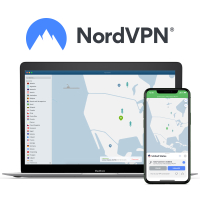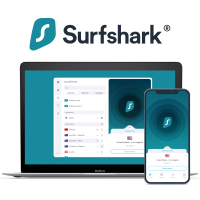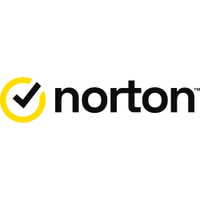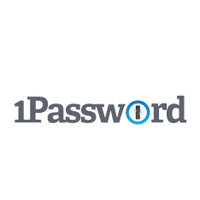How to protect your new tablet
How to properly protect the tablet you bought this Christmas

1. Top 3 best VPNs
2. How to choose a VPN
3. How we test VPNs
4. VPN FAQs
5. Top 3 best antivirus
6. How to choose antivirus software
7. How we test antivirus
8. Antivirus FAQs
9. Top 3 best password managers
10. How to choose a password manager
11. How we test password managers
12. Password managers FAQs
Tablets are value-packed machines that combine the portability and convenience of the best mobile phones and the power of a top-shelf laptop. The best tablets are ideal for just about everything, whether that's streaming your favorite content or serving as productivity powerhouses, no matter where you are. Despite this, tablets can also become victims to the dangers of the internet, including identity theft, viruses, and ransomware attacks.
For complete all-around protection, use the triad of the best VPN, the best antivirus, and the best password manager. Together, they will keep your internet activities hidden from hackers, your passwords to all your online accounts strong and secure, and alert you if your personal details are leaked anywhere.
However, as with any product, there are many options to choose from. This is where our expert-crafted guide of the top 3 VPNs, antiviruses, and password managers comes in.
The best VPN in 2025
VPNs can spoof your real IP and keep your online activity hidden from your ISP, the government, and even hackers. Plus, they can also give you access to your favorite movies and shows no matter where you are.
Tom’s Guide experts review the best VPN services day in and day out, and these are the top three:
1. ExpressVPN: the best VPN – get 3 months free
ExpressVPN is the best VPN for tablets, thanks to its easy-to-use mobile VPN apps, robust security, powerful unblocking abilities, and a wide network of servers around the world. With friendly 24/7 customer support and ample helpful guides, it’s also a perfect pick for beginners.
It’s admittedly not the cheapest, but Tom’s Guide readers can enjoy 3 months of extra protection and 1 year of Backblaze’s cloud storage for free – and there's also a 30-day money-back guarantee in case you change your mind.
2. NordVPN: the fastest VPN and packed with tools
NordVPN will fit the bill if you’re looking for a one-stop security solution and excellent speed. It comes with all the essentials, of course, but there's also tons of extras like built-in antivirus for malware protection, ad-blocking, and a password manager.
It's also the best Netflix VPN we've seen, unblocking everything thrown at it in our testing. Try it on for size risk-free with a 30-day money-back guarantee and see how it compares to ExpressVPN.
3. Surfshark: the best cheap VPN on the market
Surfshark is great for those on a tight budget, offering excellent security and class-leading speeds at less than $2.50 a month – and unlimited simultaneous connections mean that you can install the app on every one of your devices.
Streaming-wise, there’s not a fault to be found, and with easy-to-use apps across the board, it’s a go-to option for those new to VPNs as well. There’s also a 30-day money-back guarantee so that you can try it out without risking a single penny.
How to pick a VPN to secure your tablet
The security on offer is inarguably the most important thing to consider when choosing a VPN. The provider must have a strict no-logs policy so it won't track your IP or internet usage.
Next, it must support all of the most secure and latest protocols like WireGuard, OpenVPN, and IKEv2 – plus encrypt your data using industry-standard AES-256. Essential security features like a reliable kill switch and leak protection should all be in place and working well, too.
Look for a VPN that's compatible with your tablet. Top VPN providers offer dedicated apps for various distros, and while you’re at it, make sure that the VPN app is well-designed and easy to use.
If your intended use case involves gaming or streaming, the speed of the provider is going to be crucial. Fast VPNs eliminate any lags and buffering, meaning you’ll be able to enjoy an uninterrupted connection.
Your VPN provider should also boast a wide network of servers so that you can connect from and to anywhere. Lots of servers also mean that there will be fewer users per server, resulting in better results across the board.
Combined with a dense catalog of servers and powerful unblocking capabilities, a VPN becomes ideal for streaming geo-blocked content from Netflix, Amazon Prime, Disney Plus, iPlayer, and more.
Customer support should be top-notch as well, and you should be able to find help on the fly in case you run into an issue. Last but not least, the value-for-money quotient should be ample – look for a VPN that strikes a perfect balance between the features you want and the money you're comfortable shelling out.
How we test VPNs
Every six months, our experts conduct a detailed analysis of the top VPNs, combing through their websites to find out any changes in policies or introduction of new features.
Then we install their apps on popular OS – Windows, Mac, Android, and iOS – and stress test the apps and all of the features therein to see if everything works as advertised. Next, we find out the provider’s actual speeds by using different speed test websites, encryption protocols, and features.
For streaming testing, we throw multiple big-name streaming services like Netflix and BBC iPlayer at every provider. We do so from multiple locations to make sure our results are all-encompassing and accurate.
Using a VPN FAQs
What can I use a VPN app for?
A mobile VPN is unique and necessary in that it can mask your IP address, unblock streaming services, and keep you safe from intruders, wherever you are. You can be out and about and still remain secure on public Wi-Fi networks with the help of the best mobile VPN.
What features should a VPN app have?
The VPN app you choose must have a strict no-logs policy so it doesn't track your internet traffic, reliable encryption like the industry-standard AES-256, lots of servers so that you can connect from and to anywhere, fast speeds, and security essentials, including kill switch and leak protection.
The best antivirus in 2025
The best antivirus software can help keep your tablet protected from malware and other cyber threats – plus prevent your personal details from falling into the wrong hands with tools like dark web monitoring and identity theft protection.
Here are our top three recommendations:
1. Norton: the best antivirus software package
Norton 360 Deluxe is the best antivirus service in the industry right now, combining excellent malware protection with tons of valuable add-ons, like a password manager, a VPN, backup software, and more.
While it’s not the cheapest, its class-leading identity theft protection makes it every bit worth the price. Try it out risk-free with a 14-day free trial and a 60-day money-back guarantee.
2. Bitdefender: fast and accurate antivirus software with tons of extras
Bitdefender Antivirus Plus is a fully packed yet affordable security suite with good malware detection and removal – plus a VPN, a Wi-Fi scanner, a hardened browser, and a firewall.
It’s also very light on your system, even during active scans for viruses, and there’s a 30-day money-back guarantee, so you can try it out without risking anything.
3. McAfee: the best antivirus for big families
McAfee Antivirus Plus and Total Protection Plus will fit your bill if you want to protect tons of devices on a single plan. There’s no dearth of security features, either, and everything, including a password manager, identity theft protection, and 24/7 tech support, is all in place and working smoothly. For even more protection with an unlimited VPN, go for Total Protection Ultimate.
How to pick an antivirus to secure your tablet
When selecting an antivirus solution, you want to choose one with a high malware detection rate of 95 percent or more, as well as making sure that it’s able to detect and eliminate both known and unknown threats. At the same time, the provider shouldn’t have a high rate of false positives, as that can prove to be a major impediment.
Now, regardless of whether you have an old or a new tablet, you should pick software that’s light on your system both in the background and while it’s running scans.
Customization options and ease of use are important determinants, too. Depending on your needs, you can go for a solution that’s plug-and-play or something that allows you to fine-tune the settings to your liking.
If you’re looking to protect all of the devices in your home, including that of your kids, it’d be wise to opt for a full-fledged internet security suite that covers multiple devices and comes with lots of extra features, such as parental controls, password managers, backup software, identity protection or online storage.
While such all-purpose antivirus plans are really worth splurging on, they may not always fit your budget; in that case, you can opt for an entry-level plan that offers rock-solid protection. It may not have the added extras of a premium option, but it will still keep you safe.
And if you’re seriously strapped for cash, free antivirus products such as Avast Free Antivirus, AVG AntiVirus Free and Bitdefender Antivirus Free are worth a look.
How we test antivirus software
The first thing we look at is the antivirus’s performance and its impact on system resources. For this, we use a proprietary Excel-based benchmark where the device (a Lenovo ThinkPad T470 with a 2.5GHz Core i5-7200U processor, 8GB of RAM and 256GB of solid-state storage containing 43.3GB of files) has to sort through a database of 20,000 names and addresses. We run the test five times, average the results, and consider that as its baseline performance level.
Next, we run the benchmark test routine again after we’ve installed the software on the device but before we perform any scans – and then again during a scan. We time every test so we can zero in on an antivirus’s performance impact – the longer it takes the laptop to finish each test, the heavier the impact.
For malware detection scores, we combine our in-house findings with the results from the latest surveys conducted by three independent testing labs: AV-TEST in Germany, AV-Comparatives in Austria and SE Labs in England.
Last but not least, we put the antivirus app’s additional features and ease of use under the scanner. In addition to trying out tools like a firewall, a password manager, or a VPN, we also test the software’s ability to perform scheduled scans, show notifications, run the app full screen, and roll back ransomware changes.
Using antivirus FAQs
What does antivirus do?
Antiviruses protect your device(s) from malware, viruses, ransomware, and other cyber threats, including scams and phishing attempts. In addition to initiating a device-wide scan yourself, you can also set your antivirus to scan your system in real-time as/when you download any files.
Is free antivirus enough?
Free antivirus solutions can certainly protect your device against basic malware files, but they often come with irritating ads and popups and lack features like parental controls, dark web monitoring, a password manager, and identity theft protection, which are needed for foolproof protection from all cyber threats.
The best password manager in 2025
You need a password manager to protect all of the online accounts you will log into on your tablet. A top password manager can also detect phishing emails and weak passwords as well as being able to generate strong passwords to maintain airtight security.
There are lots of password managers on the market right now, but here are the absolute best, based on our testing:
1. 1Password: the best password manager overall
1Password is right for just about everybody, courtesy of compatible apps and browser extensions for all platforms. Plus, its security features are all killer, including a unique Travel Mode, “masked” email addresses, keylogging protection, and a secure data-sharing service called Psst!
2. Dashlane: the best password manager interface
Dashlane is easy to use, offers intuitive interfaces across all platforms, and is packed with features to the brim, including a bulk password changer, phishing alerts, dark web monitoring, and a built-in VPN. It has a free plan that’s admittedly limited, but you can use it to get a feel of the platform before you commit.
3. Keeper: the best password manager for security
Keeper is a force to be reckoned with when it comes to security in a password manager, even offering biometric access to your passwords on your desktop. Also, its free tier, where you get all but cross-syncing across various devices, outperforms many others and is ideal for those on a tight budget.
How to choose a password manager to secure your tablet
Every credible password management service is rock-solid when it comes to storing an unlimited number of passwords and passkeys to all of your online accounts – and that's why you have to look at the extras on offer.
Do you want to be alerted about data breaches? If so, solutions like Dashlane, Keeper, and 1Password will fit your bill. Depending on your needs, you may also choose a password manager that can store your credit card numbers, addresses, and even a few pictures.
The place to store your encrypted information – cloud vs local – can be more important than anything else. Local storage implies saving everything on your device itself; your data doesn't leave your device, it's not on the internet, and it doesn't get shared with any remote server, meaning it's almost a perfect match for privacy-focused individuals.
On the other hand, cloud-based password managers can be just as secure. Plus, their biggest advantage is data synchronization across all of your devices, making them more practical in today's day and age.
Yes, there's admittedly a small risk here. If a hacker manages to breach one of your password manager’s servers, all of your data can be compromised. However, that won't be a concern if you choose one of the best password managers – all of them are rock-solid and have never faced any security breaches.
Next, make sure that your chosen provider is compatible with your tablet and that it's within your budget. If you're pinching for pennies, check out password managers with excellent free tiers, like Bitwarden, NordPass, and Dashlane.
How we test password managers
We take the top 30 password managers and test how easy they are to use and whether their support options are actually helpful.
For this, we try all of their apps hands-on on different devices, including a Samsung Note 20 smartphone, a ThinkPad T470 running Windows 10, and an iPad Pro. And to put browser extensions under the scanner, we used Microsoft Edge, Google Chrome, and Mozilla Firefox.
We then check their auto-fill capabilities by adding our credentials from several sites like Facebook, Twitter, and Washington Post. Next, we try out any add-ons on offer, such as multi-factor authentication, cross-platform synchronization, or a VPN.
For more info on our testing process, check out our how we test page for Tom's Guide.
Password managers FAQs
Do password managers work with apps?
Yes. Password managers offer all sorts of apps for Android and iOS tablets – and most tablets use biometrics/passcodes/face ID for even more security of your stored passwords and passkeys.
Are password managers safe?
Password managers, like any other computer system, can be hacked. However, you can rest assured that the recommendations on our list of the best password managers are all very secure, and they've never been hacked. They use zero-knowledge architecture and state-of-the-art algorithms to encrypt and decrypt passwords.
Sign up to get the BEST of Tom's Guide direct to your inbox.
Get instant access to breaking news, the hottest reviews, great deals and helpful tips.

Olivia joined Tom's Guide in October 2023 as part of the core Tech Software team, and is currently VPN Commissioning Editor. She regularly uses VPNs to make sure they deliver what they promise, and specializes in testing VPNs with streaming sites.
- Krishi ChowdharyContributor









